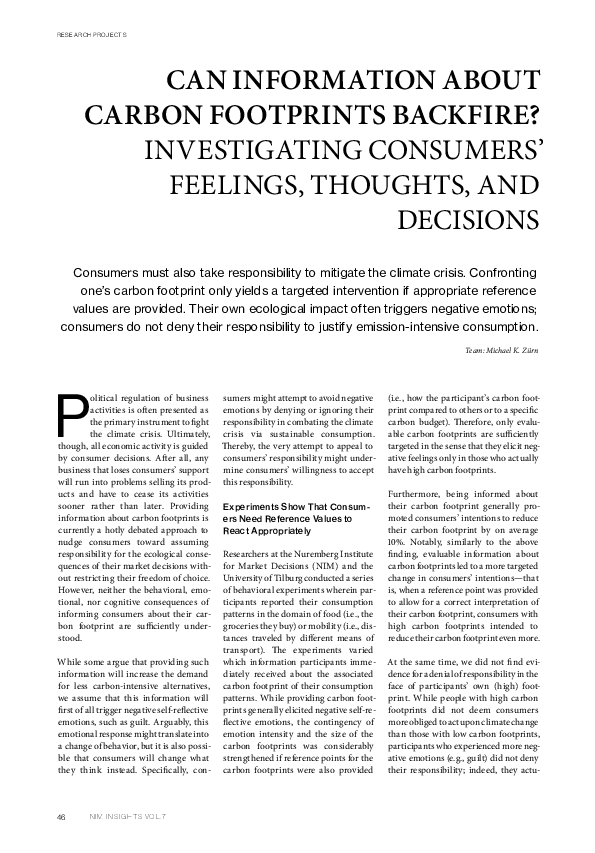Forschung
Can Information About Carbon Footprints Backfire?

PHOTO: ZODEBAL A . GETTY IMAGES
Consumers must also take responsibility to mitigate the climate crisis. Confronting one’s carbon footprint only yields a targeted intervention if appropriate reference values are provided. Their own ecological impact often triggers negative emotions; consumers do not deny their responsibility to justify emission-intensive consumption.
Political regulation of business activities is often presented as the primary instrument to fight the climate crisis. Ultimately, though, all economic activity is guided by consumer decisions. After all, any business that loses consumers’ support will run into problems selling its products and have to cease its activities sooner rather than later. Providing information about carbon footprints is currently a hotly debated approach to nudge consumers toward assuming responsibility for the ecological consequences of their market decisions without restricting their freedom of choice. However, neither the behavioral, emotional, nor cognitive consequences of informing consumers about their carbon footprint are sufficiently understood.
While some argue that providing such information will increase the demand for less carbon-intensive alternatives, we assume that this information will first of all trigger negative self-reflective emotions, such as guilt. Arguably, this emotional response might translate into a change of behavior, but it is also possible that consumers will change what they think instead. Specifically, consumers might attempt to avoid negative emotions by denying or ignoring their responsibility in combating the climate crisis via sustainable consumption. Thereby, the very attempt to appeal to consumers’ responsibility might undermine consumers’ willingness to accept this responsibility.
Experiments Show That Consumers Need Reference Values to React Appropriately
Researchers at the Nuremberg Institute for Market Decisions (NIM) and the University of Tilburg conducted a series of behavioral experiments wherein participants reported their consumption patterns in the domain of food (i.e., the groceries they buy) or mobility (i.e., dis- tances traveled by different means of transport). The experiments varied which information participants immediately received about the associated carbon footprint of their consumption patterns. While providing carbon footprints generally elicited negative self-reflective emotions, the contingency of emotion intensity and the size of the carbon footprints was considerably strengthened if reference points for the carbon footprints were also provided (i.e., how the participant’s carbon foot- print compared to others or to a specific carbon budget). Therefore, only evaluable carbon footprints are sufficiently targeted in the sense that they elicit negative feelings only in those who actually have high carbon footprints.
Furthermore, being informed about their carbon footprint generally promoted consumers’ intentions to reduce their carbon footprint by on average 10%. Notably, similarly to the above finding, evaluable information about carbon footprints led to a more targeted change in consumers’ intentions—that is, when a reference point was provided to allow for a correct interpretation of their carbon footprint, consumers with high carbon footprints intended to reduce their carbon footprint even more.
At the same time, we did not find evidence for a denial of responsibility in the face of participants’ own (high) footprint. While people with high carbon footprints did not deem consumers more obliged to act upon climate change than those with low carbon footprints, participants who experienced more negative emotions (e.g., guilt) did not deny their responsibility; indeed, they actually considered consumers more obligated to mitigate global warming. While this finding is noteworthy, participants did not consider consumers to be particularly responsible in general. Instead, businesses and the public sector (i.e., the government and the state) were expected to bear the bulk of the burden. For instance, when asked which share of the investments necessary to transition into a carbon-neutral economy the public sector, businesses, and consumers should shoulder, only about 15% of the total investment amount was assigned to consumers, whereas the public sector and businesses were assigned 38% and 47%, respectively. In other words, while consumers generally did not seem to assume much responsibility for the ecological consequences of their decisions, pointing out their own carbon footprint at least did not make things significantly worse.
Carbon Footprints Can Be a Viable Nudging Strategy Toward More Sustainable Consumption
In sum, the findings yield several relevant insights. First, confronting consumers with their carbon footprint promoted their intentions to reduce emissions. To be sure, intentions are not behavior, but they are the first step toward a sustainable behavioral change. Foremost, the translation of intentions into behavior requires the availability (both physically and psychologically) of sustainable alternatives at the point of sale. Therefore, manufacturers, providers, and policymakers must further intensify their efforts to give consumers feasible and attractive alternatives to let them develop their own sustainable lifestyles.
Second, information about carbon footprints must be evaluable to have a targeted effect. Only if their own carbon footprint can be compared to adequate reference points can consumers correctly interpret their ecological impact and act accordingly. Without an appropriate context, carbon footprints simply make people feel bad, even those who have little reason to feel guilty. Considering people’s rising climate anxiety, which especially paralyzes the younger generations, the affective consequences of providing carbon footprints generally must be kept in mind to reach a nuanced evaluation of this nudging technique.
Finally, denying consumers’ (and therefore their own) responsibility in counteracting climate change did not seem to be a preferred way of coping with the negative emotions induced by seeing one’s own carbon footprint. Instead, feeling guilty rather seemed to be related to attributing more responsibility to consumers. Nonetheless, consumers primarily seem to see policymakers and businesses as having the duty to deliver. Apparently, consumers do not (want to) fully acknowledge that their market decisions ultimately determine the fate of all products, as well as the—some- times unsustainable—business activities providing them.
KEY INSIGHTS
- Providing reference points for carbon footprints helps consumers interpret their environmental impact.
Negative emotions triggered by a person’s carbon footprint information don’t lead to denial of responsibility.
Informing consumers about their carbon footprint increases their intention to reduce emissions, but behavioral change requires accessible and attractive sustainable alternatives.
Consumers expect businesses and governments, not individuals, to shoulder most of the responsibility for climate action.
Projektteam
- Dr. Michael K. Zürn, Senior Researcher, NIM, michael.zuern@nim.org
Kooperationspartner
- Dr. Thorsten M. Erle, Assistant Professor, Tilburg University
Kontakt

